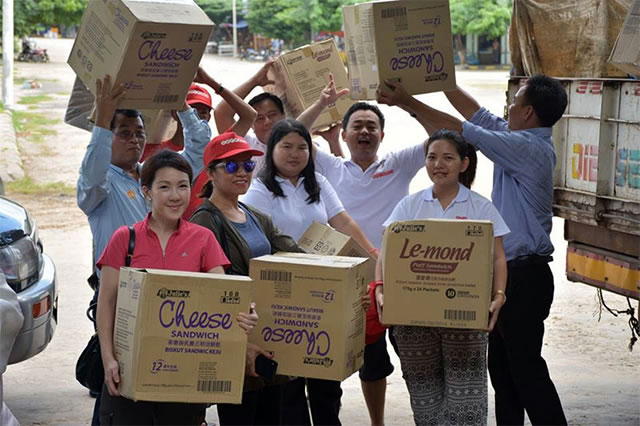Company Outreach supports Development

When it comes to the poverty gap in Myanmar, foreign and local companies can bring employment, training, and support.
On the one hand, it is good to see businesses helping both with short-term relief projects and longer terms programmes, but on the other hand the question arises as to how effective these programmes are when one looks at the major scale of the problem.
In the following interview, published on Mizzima.com, Vicky Bowman, director of the Myanmar Centre for Responsible Business, discusses the role businesses can play in the ongoing development of Myanmar.
How are foreign and local businesses using their CSR initiatives to help with poverty alleviation in Myanmar?
Generally large western multinationals don't use the term CSR and nor does MCRB as the phrase is understood by different people in different ways, from basic compliance to responsible business conduct to community investment to philanthropy, either pure or as branding, and all combinations of the above.
Myanmar is rated the world’s more generous country by the Charities Aid Foundation. There are plenty of examples of business philanthropy in Myanmar, whether to address poverty, such as education programmes, or particular disasters like the floods, which engage both the wealthy and employees. But these are not 'creating shared value'; they are dependent on the donors having spare cash to redistribute.
Nowadays more sophisticated companies address their community or social investment through the lens of 'creating shared value' in which they consider how what they do as a business can be engineered to also address social issues. Typical examples are companies who invest extra in developing really local SME suppliers rather than opting for easier options of using existing companies from Yangon, or financial companies developing banking products for the poorest and building interest in banking.
Can you think of any useful examples?
Unilever has two good examples in Myanmar of shared value. One is supporting hand washing and tooth brushing programmes in schools since this encourages better hygiene but also builds a market for Unilever's project. Another is the procurement of jiggery (cane sugar) from the dry zone, for export to Unilever soy sauce factories in Indonesia, where they are partnering with Action Aid to procure reliable supplies from dry zone farmers. Both are examples where what they are doing to help address poverty is embedded in their business model.
From your experience in monitoring this outreach, how much do businesses focus on the "quick fix" - e.g. relief supplies during a disaster - or on longer-term solutions?
It varies, but generally large multinationals are more experienced at considering long term solutions and have decades of experience of making mistakes and refining their approach. However, faced with a major disaster, most companies will consider how they can respond and also facilitate their employees' desire to help.
It's important though that this is done effectively and does no harm. Companies need to learn from and work with relief organisations.
Endemic poverty is a major challenge in Myanmar, a country only just beginning to develop after decades of misrule. Can businesses make much of an impact given the scale of the challenge?
Businesses can most effectively reduce poverty by creating decent jobs and paying the taxes they owe. And government needs to facilitate their ability to do that with good, predictable policies that encourage investment and enforce environmental and social regulation.
Businesses should not - and mostly do not - pretend that their primary goal is to address poverty. But it can be a side effect of some businesses.
In terms of the quick fix vs. longer-term solutions, how much are businesses seeking to empower local people to help themselves? Are there any useful examples?
Heineken, Coke, Telenor and Wanbao are just a few examples of companies who are working to stimulate the creation of and raise the standards of local SMEs into reliable suppliers for them and other companies. Some of these companies have partnered with Building Markets. BM has previously done the same for local SMEs looking to compete for procurement contracts for aid programmes. Oil and gas companies are also keen to have a broad supply base for services. Building local companies, and recruiting and skilling up local employees, is the most important investment a company can make in the economy.
What should businesses focus on in their CSR outreach?
Businesses need to understand local priorities by talking to local communities, and jobs are usually close to the top of the list, followed usually by electricity supply. They need to be clear about what it is appropriate for the company to address and what is the government's role. Those involved in infrastructure, such as extractives companies who are building access roads etc. should discuss these with local communities in case there are affordable changes which can be introduced, which can also meet community needs e.g. a road to market. The same is true for power or water supplies, where there may be scope to adapt to meet community needs. But these shouldn't be given away by companies which creates an unhealthy dependency.
Businesses shouldn't get sucked into filing local gaps in social services such education and health provision unless there is a clear business need e.g. to eradicate the malaria burden in the entire area so that employees and therefore the company are not affected, or to train local people so that they are employable. Communities should not be forced to be dependent on a company for basic rights like education and health. Governments need to step up to the plate.
 English
English မြန်မာ
မြန်မာ မြန်မာ (unicode)
မြန်မာ (unicode)








